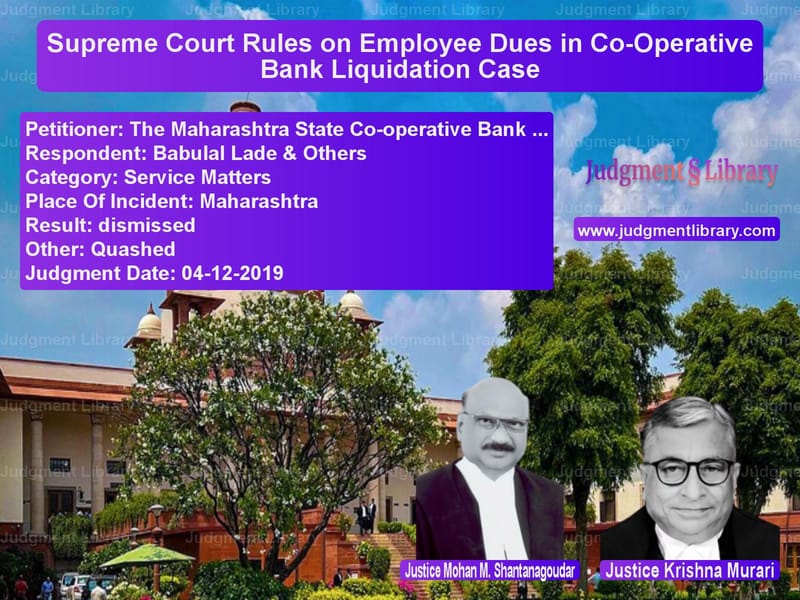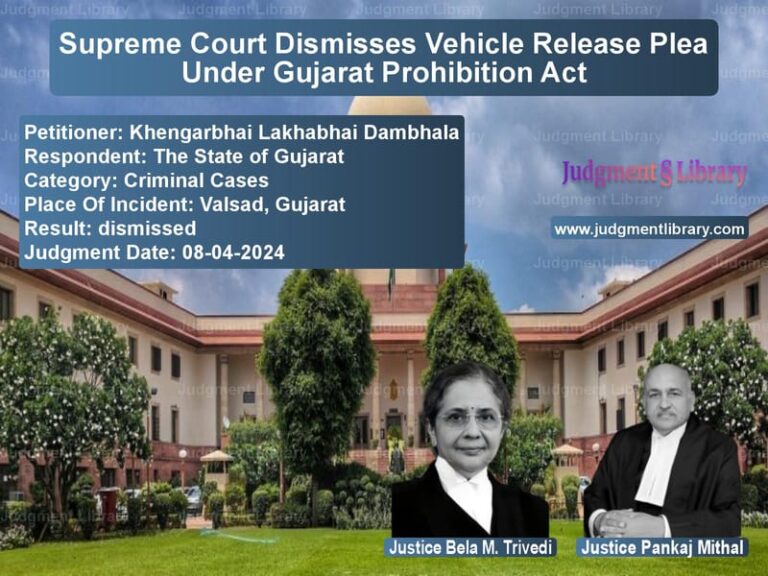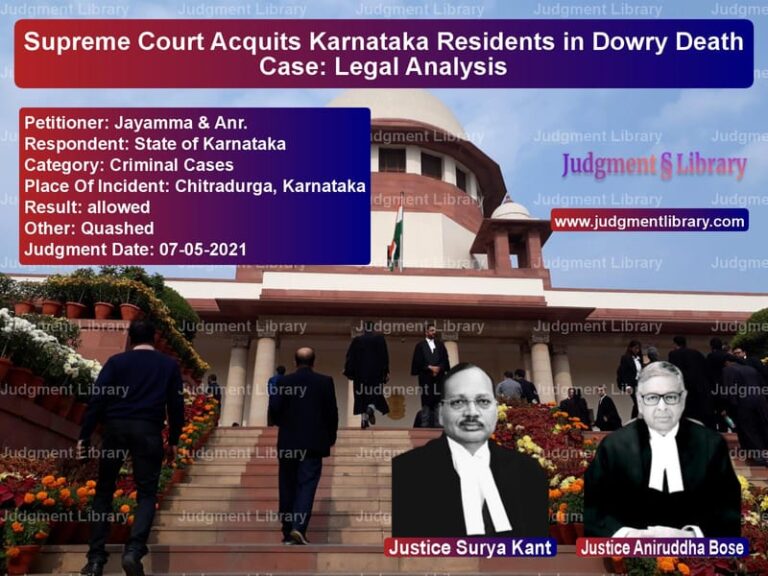Supreme Court Rules on Employee Dues in Co-Operative Bank Liquidation Case
The Supreme Court, in The Maharashtra State Co-operative Bank Ltd. vs. Babulal Lade & Others, delivered a landmark ruling concerning employee dues in cases involving co-operative societies undergoing liquidation. The judgment clarifies the priority of employee dues in comparison to secured creditors under the SARFAESI Act.
Background of the Case
The dispute arose after Vainganga Sahakari Sakhar Karkhana Ltd. (hereinafter ‘Karkhana’), a co-operative sugar factory in Maharashtra, defaulted on loan repayments to the Maharashtra State Co-operative Bank (hereinafter ‘Bank’). The bank initiated recovery proceedings under the Securitisation and Reconstruction of Financial Assets and Enforcement of Security Interest Act, 2002 (‘SARFAESI Act’), took possession of the mortgaged property, and auctioned it in 2010.
Meanwhile, Karkhana employees had not been paid wages since 2003. The Industrial Court held that this amounted to an unfair labor practice and directed payment of wages. When the employer failed to comply, employees sought a recovery certificate under the Maharashtra Recognition of Trade Unions & Prevention of Unfair Labour Practices Act, 1971 (‘MRTU & PULP Act’). The High Court modified the order to allow the Collector to recover employee dues from the proceeds of the auctioned property.
Challenging this, the Maharashtra State Co-operative Bank approached the Supreme Court, arguing that secured creditors had first right over the proceeds.
Legal Issues Before the Supreme Court
- Whether Section 529A of the Companies Act, 1956 applies to co-operative societies in liquidation.
- Whether employees’ dues take precedence over the claim of secured creditors under the SARFAESI Act.
- Whether Section 50 of the MRTU & PULP Act, which allows for the recovery of employee wages as arrears of land revenue, gives them priority over secured creditors.
Arguments by the Appellant (Maharashtra State Co-operative Bank Ltd.)
- Section 167 of the Maharashtra Co-operative Societies Act, 1960 expressly bars the application of the Companies Act to co-operative societies.
- Section 13(7) of the SARFAESI Act prioritizes the claims of secured creditors over any other claim.
- The High Court wrongly held that the sale proceeds of Karkhana’s assets should be held in trust for employees’ dues.
Arguments by the Respondent (Employees and Government Authorities)
- Under Section 50 of the MRTU & PULP Act, employee dues are recoverable as arrears of land revenue.
- Section 169 of the Maharashtra Land Revenue Code gives land revenue claims precedence over all unsecured claims.
- The bank had agreed in a sale letter to take responsibility for employee dues before auctioning the property.
Supreme Court’s Judgment
The Supreme Court ruled in favor of the employees, holding that their dues must be paid from the sale proceeds of Karkhana’s property. The Court made the following key observations:
“Section 167 of the Maharashtra Co-operative Societies Act bars the application of the Companies Act to co-operative societies. Therefore, Section 529A of the Companies Act, which prioritizes employee dues, does not apply here.”
However, the Court also noted:
“While employee dues are recoverable as arrears of land revenue, Section 169(1) of the Maharashtra Land Revenue Code applies only to government land revenue. Employee wages fall under Section 169(2), which gives them priority only over unsecured claims, not secured creditors.”
The Court further ruled:
“The bank, through its sale letter, explicitly undertook responsibility for employee dues before auctioning the Karkhana property. This contractually binds the bank to settle the employee wages before appropriating the remaining proceeds.”
Key Takeaways from the Judgment
- Employee dues are recoverable as arrears of land revenue but do not automatically take precedence over secured creditors unless specifically legislated.
- A contractual commitment, such as the bank’s sale letter, can override statutory priority under the SARFAESI Act.
- Secured creditors must settle employee dues before appropriating sale proceeds in cases where they have explicitly agreed to do so.
Final Decision
- The Supreme Court upheld the High Court’s order directing the Collector to recover employee dues from the sale proceeds.
- The Maharashtra State Co-operative Bank was ordered to pay Rs. 13.89 crore to employees within six months.
- All other statutory dues, including provident fund and gratuity, were to be settled by the subsequent purchaser.
Implications of the Judgment
This ruling strengthens employee rights in cases where employers default on wages. It sets a precedent that contractual commitments by financial institutions can override statutory provisions, ensuring that employees are not left without remedies. The judgment also emphasizes that secured creditors must act in good faith when auctioning assets under the SARFAESI Act.
Petitioner Name: The Maharashtra State Co-operative Bank Ltd..Respondent Name: Babulal Lade & Others.Judgment By: Justice Mohan M. Shantanagoudar, Justice Krishna Murari.Place Of Incident: Maharashtra.Judgment Date: 04-12-2019.
Don’t miss out on the full details! Download the complete judgment in PDF format below and gain valuable insights instantly!
Download Judgment: The Maharashtra Stat vs Babulal Lade & Other Supreme Court of India Judgment Dated 04-12-2019.pdf
Direct Downlaod Judgment: Direct downlaod this Judgment
See all petitions in Pension and Gratuity
See all petitions in Employment Disputes
See all petitions in Termination Cases
See all petitions in Debt Recovery
See all petitions in Judgment by Mohan M. Shantanagoudar
See all petitions in Judgment by Krishna Murari
See all petitions in dismissed
See all petitions in Quashed
See all petitions in supreme court of India judgments December 2019
See all petitions in 2019 judgments
See all posts in Service Matters Category
See all allowed petitions in Service Matters Category
See all Dismissed petitions in Service Matters Category
See all partially allowed petitions in Service Matters Category







